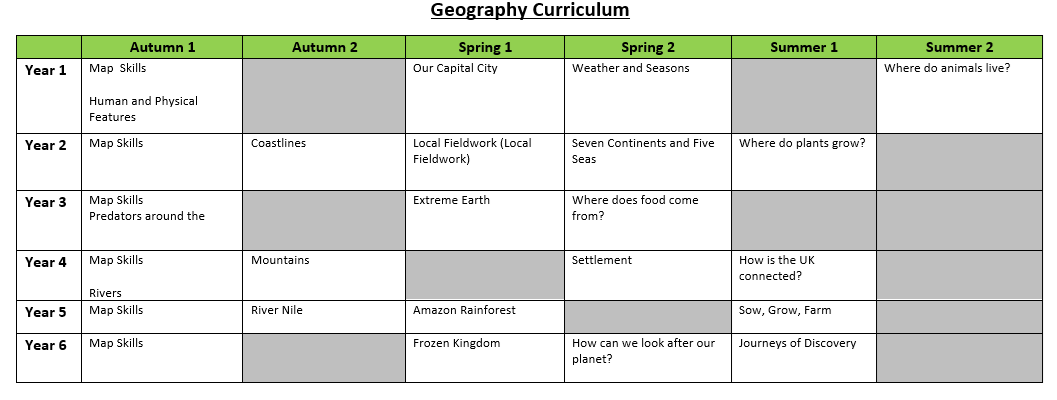
Geography

Intent
At St James, our Geography curriculum aims to inspire pupils with a curiosity and fascination about the world, its people, and the processes that shape it. We want children to understand their place in the world, from their local community to the global stage, and to develop the knowledge and skills needed to become responsible global citizens.
Our curriculum is designed to:
- Meet and exceed the National Curriculum through a well-sequenced programme that builds knowledge and skills year on year.
- Start with the familiar and expand outwards, moving from the local area in KS1 to contrasting regions and global issues by the end of KS2.
- Develop core geographical skills – map reading, fieldwork, enquiry, and geographical vocabulary – revisited each year to build progression.
- Engage with human and physical geography so pupils understand both natural processes (volcanoes, earthquakes, rivers, mountains, weather, climate) and human influences (settlements, farming, trade, sustainability).
- Foster respect for diversity and care for the planet.
Implementation
Our curriculum is taught through knowledge-rich, enquiry-led units that connect local, national and global perspectives. It follows a clear progression:
- Map Skills (Years 1–6): Every year begins with a map skills unit, revisiting and extending children’s use of maps, globes, atlases, compasses, grid references, and digital mapping. This ensures fluency in geographical enquiry.
- KS1 – Local and National Focus:
- Year 1 explores human and physical features, the capital city, weather and seasons, and animal habitats around the world.
- Year 2 builds on this with coastlines, local fieldwork, continents and oceans, and where plant grow.
- Lower KS2 – Expanding Outwards:
- Year 3 investigates predators around the world, extreme earth (volcanoes), and food origins.
- Year 4 deepens understanding of rivers, mountains, settlements, and how the UK is connected to the wider world.
- Upper KS2 – Global Perspectives:
- Year 5 looks closely at the River Nile and the Amazon Rainforest as well as studying trade, farming and sustainability.
- Year 6 studies the Frozen Kingdom, global citizenship and sustainability (How can we look after our planet?).
Fieldwork and enquiry are embedded throughout through enquiry questions. Children undertaken fieldwork and enquiry in all units of work such investigating their local area, study food journeys, explore how human and physical geography are interconnected.
Impact
Through this curriculum, our children will:
- Gain secure locational knowledge at local, national, and global scales.
- Understand key physical and human processes and their interconnections.
- Use fieldwork and enquiry skills with confidence to investigate and interpret geographical questions.
- Build cultural capital by learning about diverse places, people, and environments.
- Leave primary school as knowledgeable, curious, and responsible global citizens, ready for secondary school and beyond.
This will be seen through:
- The children books and the work which they produce in class.
- Through talking to the children about their learning – what they can remember, the knowledge and skills they have and interconnecting ideas etc. This will be evident through Pupil Book Study.

